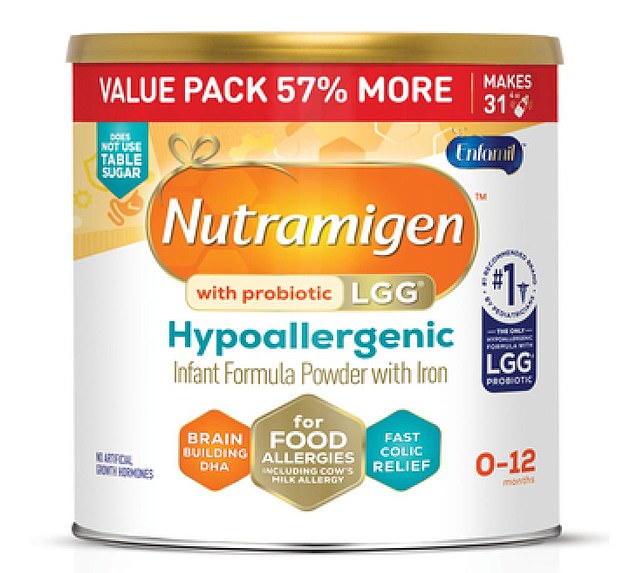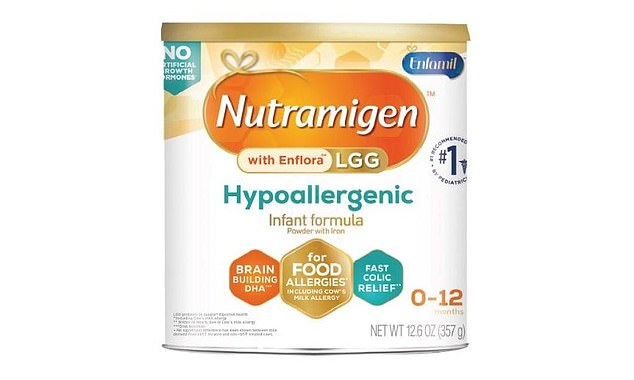Baby formula recalled over concerns of possible contamination with bacteria that causes brain swelling and seizures in infants
More than 675,000 cans of baby food are being recalled over concerns they are contaminated with a bacteria that can cause life-threatening health complications in infants.
Reckitt/Mead Johnson Nutrition (MJN) announced this weekend that it is voluntarily recalling select cans of its specialty infant formula, Nutramigen Powder – baby food made for infants with an allergy to cow's milk – because they may be contaminated with the bacteria Cronobacter sakazakii.
The company said products sold outside the United States tested positive for the bacteria, but it was not found in any batches tested in the US.
The recall applies to several batches of the formula in 12.6 oz and 19.8 oz cans manufactured in June 2023 and distributed through retail stores nationwide between June and August.
Cronobacter sakazakii is a bacterium that lives in dry places such as dairy milk, herbal teas, and powdered infant formula, and infections with the bacterium can cause brain swelling and seizures in infants.

The recall applies to Nutramigen Powder – baby food specially formulated for infants with an allergy to cow's milk


The recall applies to several batches of the formula in 12.6 oz and 19.8 oz cans manufactured in June 2023
The recall does not apply to Nutramigen liquid formulas or the company's other nutritional products, and further testing of batches suspected of being contaminated have tested negative for the bacteria.
Reckitt/Mead Johnson Nutrition said in a press release: “The health and safety of infants is our top priority. All of our products undergo rigorous and industry-leading quality testing and controls to ensure they meet or exceed all regulatory agency standards, including the World Health Organization and the U.S. Food and Drug Administration.
'It is for this reason that we are confident in the safety and quality of every infant formula we make.'
The Food and Drug Administration said it was notified on December 14 by the Israeli Ministry of Health that the Nutramigen product, produced at the Mead Johnson Nutrition plant in Zeeland, Michigan and exported from the US, had tested positive for Cronobacter.
The product was tested during a routine sampling at the Israeli border.
Following the test results, FDA and Israeli officials conducted whole genome sequencing on a sample of the affected formula to confirm the initial findings. Once confirmed, the FDA contacted Rickitt/Mead Johnson Nutrition and recommended a recall.
The FDA also began an inspection at the Michigan plant on December 18, with additional samples taken. The investigation is still ongoing, but all further samples have tested negative for the bacteria.
Cronobacter infections are rare, according to the Centers for Disease Control and Prevention, but can be life-threatening in newborns.
About two to four cases are reported to health authorities each year, but the number is likely higher because hospitals and laboratories are not required to report Cronobacter infections to health departments.
The bacteria can cause a blood infection or sepsis and can cause the brain and spinal cord to swell.
Babies under two months of age are at greatest risk and most likely to develop meningitis.
Premature babies and children with compromised immune systems are also at greater risk of infection.
Cronobacter infections usually start with fever, poor feeding, excessive crying and very little energy.
In severe cases, some babies may also experience seizures.
Cronobacter can enter infant formula if the manufacturer uses contaminated ingredients or if the bacteria is on surfaces and the powder comes into contact with it.
The bacteria occurs naturally in the environment, but poses a threat to the health of young children with developing immune systems. It was also behind the 2022 baby food recalls.
The FDA said it has not reported any illnesses related to the recall and due to limited supply, it is likely that all of the product available in the U.S. has already been consumed.
The FDA advises anyone with cans of formula included in the recall to discontinue use and discard the product.
Although formula is a special product for babies with a cow's milk allergy who cannot drink regular formula or breastfeed, there are alternative, equivalent products that parents can use.
In 2022, the US experienced a severe shortage of baby formula due to supply chain issues and two major infant formula recalls. However, the FDA said it does not expect this recall to have a major impact on the supply and availability of infant formula.
In addition, the FDA said it has communicated with other manufacturers of hypoallergenic products to ensure “a robust supply” of similar formulas.
It is not known exactly how many babies use the Nutramigen product, but it is estimated that between two and five percent of babies and young children have an allergy to cow's milk, which can be present in breast milk and traditional formula.
